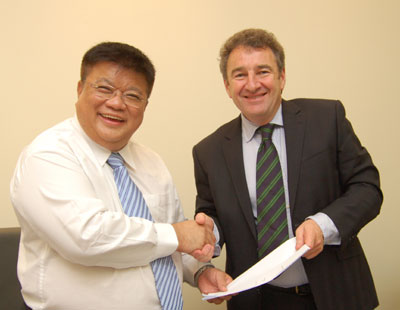
Venue: Furama Hotel
Time & date: 2 pm, May 30

Photo: annual report
THERE WAS clapping and cheering from Oceanus Group shareholders when it was announced that Yu De Hua had failed to be re-elected as a director of the company.
By a poll, shareholders representing more than 90% of the shareholding of Oceanus voted against his re-election.
Mr Yu, 52, a mainland Chinese national, was not present at the AGM.
His non-reelection was a rare case of a director retiring by roation and a resolution for his re-election was voted against successfully (and overwhelmingly).
In a way, the ignominous outcome was a foregone conclusion, given the anger and disappointment that shareholders expressed at the AGM towards the events that led to huge losses in the abalone assets of the group last year.
A big crowd of shareholders attended the meeting.
Many among the 8,700 shareholders on Oceanus' register have suffered heavy losses on their investment in the shares, whose price has plunged from around 25 cents last May to 6.5 cents recently. That gives Oceanus a market cap of $131 million.
A casualty is Mr Yu himself, who was removed by the board of directors in February 2012 from his position as CEO of the company and Legal Representative in China of its subsidiaries.
He, however, remained as a member of the Board and was re-designated as a non-executive director -- until his non-reelection yesterday which effectively ended his formal ties with the company.
Oceanus incurred a loss of RMB790 million due to the changes in the fair value of the biological assets for FY11.
"The loss was mianly due to high mortality rates and culling of laggards," according to Oceanus' annual report, which added that expert advice suggested a lack of nutrition compounded by husbandry problems.

NextInsight file photo
Dr Ng Cher Yew, the executive chairman is currently also the interim CEO while Oceanus looks for a new CEO.
He was asked about the possibility of legal action against Mr Yu.
"The case is ongoing. Should there be evidence of fraud, we will take action," replied Dr Ng.
A woman shareholder pointed out that Mr Yu (and Dr Ng) was paid big bonuses in the past based on the company's reported profits which arose largely from increases in the fair value of the abalone assets -- rather than on actual profits derived from the sale of the abalones.
"The remuneration was more than S$1 million a year*. This way of remunerating is unfair and very wrong. The bonuses should be clawed back from the CEO who has made a mess of our company."

Legal action?
Mr Chua Hung Meng, an independent director and chairman of the remuneration committee, replied that his committee was reviewing the bonus issue.
"We are looking at a new remuneration package for the CEO and chairman."
He explained that the bonus payout in the past was part of an agreement that came into effect when Oceanus became a listed company via a reverse takeover in April 2008.
(* In the Oceanus annual reports, Mr Yu's remuneration was reported to be in the S$250K-$1 m range in years 2009 and 2010. It fell to $250K-500K in 2011 -- not surprisingly. His bonuses comprised 60%, 32% and nothing in those years, respectively).
Look out for Part 2 of our Oceanus AGM report next week.







The management does not have an emergency plan to curb the lost of the abalones. They do not have the “what if” attitude inside them. And I believe this is not their first year in the business.
Regrettably, the lack of foresight from the company has brought to today’s disaster.
It is a business similar to the fish farming we see in Singapore and elsewhere. I urge the management to learn from them and adhere to strict security and farming matters. To me, a lot of common sense, hard work and dedication are required to make this business a continuing success.
Going forward, let us support and wish Dr Ng and his team success. Over time we should see shareholder value improving, as he has rightly pointed out.